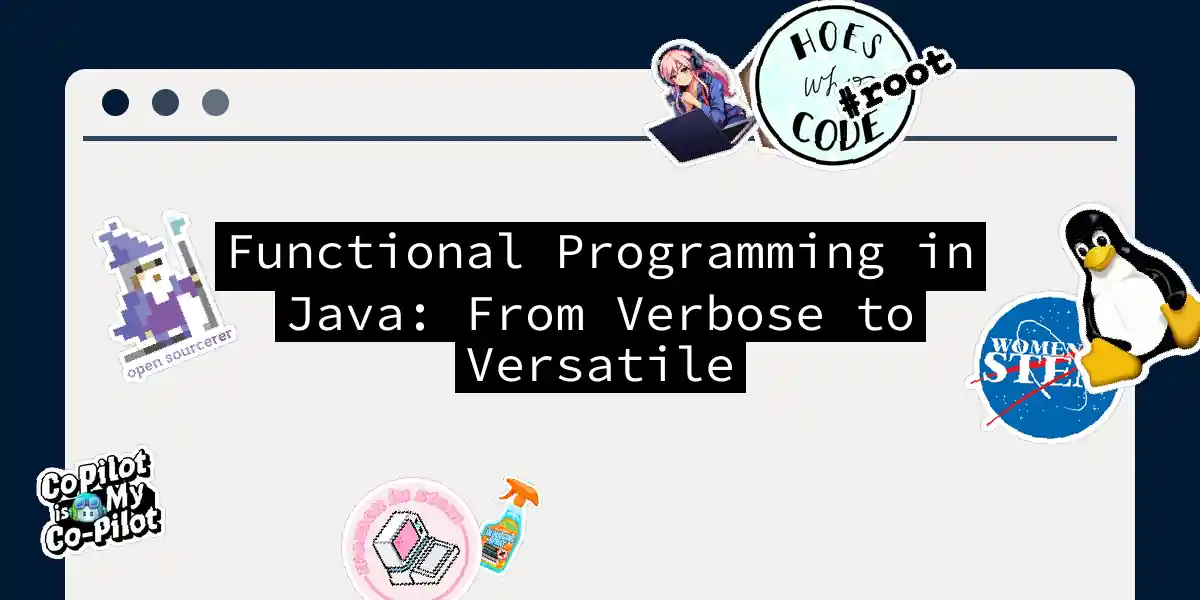Functional programming in Java transforms how we write code, turning verbose solutions into elegant pipelines. By embracing immutability, pure functions, and declarative patterns, we unlock parallel processing capabilities and reduce side-effect bugs. Let’s explore how Java’s functional features—lambdas, streams, and monads—can revolutionize your coding approach.
🧩 Functional Interfaces & Lambdas: The Foundation
Functional interfaces are Java’s gateway to FP. These single-method interfaces enable lambda expressions, replacing anonymous inner classes with concise syntax:
// Traditional anonymous class
Runnable oldSchool = new Runnable() {
@Override
public void run() {
System.out.println("Clunky!");
}
};
// Lambda equivalent
Runnable modern = () -> System.out.println("Concise!");
Key built-in interfaces:
Predicate<T>: Boolean test (e.g.,x -> x > 5)Function<T,R>: Type transformation (e.g.,s -> s.length())Consumer<T>: Side-effect operation (e.g.,obj -> db.save(obj)) Pro tip: Use@FunctionalInterfaceannotation to enforce single-method contracts.
🌊 Streams API: Data in Motion
Java Streams turn collections into declarative pipelines. Unlike iterative loops, streams process data through composed operations:
List<String> transactions = getTransactions();
List<String> filtered = transactions.stream()
.filter(t -> t.startsWith("TX-")) // Intermediate op
.map(String::toUpperCase) // Intermediate op
.collect(Collectors.toList()); // Terminal op
Stream stages explained:
- Source: Create from collections/arrays
- Intermediate ops: Transform data (filter, map, sorted)
- Terminal op: Produce result (collect, forEach)
Memory trick: Streams are like assembly lines—items move through stations until packaged at the end.
🔍 Advanced FP Techniques
Monads: Safe Value Handling
Optional is Java’s monad for null safety. Wrap potentially empty values to avoid NullPointerException:
Optional<User> user = findUserById(42);
String name = user.map(User::getName)
.orElse("Anonymous");
Currying: Specialized Functions
Break multi-arg functions into sequences:
Function<Integer, Function<Integer, Integer>> adder = a -> b -> a + b;
Function<Integer, Integer> addFive = adder.apply(5);
System.out.println(addFive.apply(3)); // 8
Recursion: Functional Looping
Prefer recursion over mutable counters:
int factorial(int n) {
return (n <= 1) ? 1 : n * factorial(n - 1);
}
Caution: Java lacks tail-call optimization—use recursion judiciously.
🚀 Why Go Functional?
- Parallelism: Replace
synchronizedblocks withparallelStream() - Debugability: Pure functions simplify testing
- Conciseness: Reduce boilerplate by 40-70%
- Readability: Declarative code expresses intent clearly
// Imperative approach
List<String> results = new ArrayList<>();
for (String item : items) {
if (item != null && item.length() > 3) {
results.add(item.toUpperCase());
}
}
// Functional equivalent
List<String> results = items.stream()
.filter(Objects::nonNull)
.filter(s -> s.length() > 3)
.map(String::toUpperCase)
.collect(Collectors.toList());
💡 When to Use FP
- Data transformation pipelines
- Event-driven logic
- Concurrent processing
- Optional data handling
Golden rule: Mix OO and FP—use classes for state, functions for behavior.
Functional programming in Java isn’t about discarding objects—it’s about choosing the right tool for each task. Start small: replace one loop with a stream, or try an
Optionalinstead of null-checking. Your future self (and teammates) will thank you when that code needs debugging! 🎉
